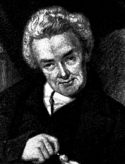William Wilberforce and the Great Change

William was anxious as he walked around the square one more time, trying to summon courage to face his scheduled meeting with John Newton, a friend and pastor from his boyhood. He thought back with regret over the years since they had last met in his Uncle’s home, and wondered just what the outspoken former slave-ship captain would have to say about the situation in which William now found himself.
William Wilberforce bought his way into politics. He was only 20 years old when he began campaigning to represent Hull, one of the top 20 districts in all of England. He spent the summer of 1780 hosting expensive dinners and charming the electors in his district, culminating with a huge ox-roast at his estate in August. He invited everyone in the district to a lavish celebration and provided food, drink and music to celebrate his 21st birthday, which coincidentally fell just two weeks before the election. All in all, Wilberforce spent about £9,000 (over a half-million dollars in today’s money) wooing his constituents and won the election by a landslide.
Seeing this great expense might cause someone to think that Wilberforce had a serious political agenda he hoped to implement, but nothing could be farther from the truth. He was wealthy and spoiled, given to excess and had what he called a “butterfly mind,” prone to flitting lightly from topic to topic. He was charming, but had little depth. Still, he gradually began to earn notoriety in Parliament for his rapier wit and ruthless eloquence in debate.
Of course, all that was before what Wilberforce called “the great change.” During the winters of 1784 and 1785, Wilberforce asked an old school friend, Isaac Milner, to accompany him to the French Riviera and the Italian Riviera for vacations. At first he did not realize that Milner was “an Enthusiast”—an evangelical Christian. Enthusiasts were looked down upon in English society. Only two known evangelicals were members of the House of Commons, even though the historic revival called the Great Awakening had begun years before, creating large numbers of converts. Milner was brilliant and a fitting guide for Wilberforce as they worked through the basic apologetic issues of Christianity that first winter and studied the Greek New Testament together the next year.
Wilberforce said, “By degrees, I imbibed [Milner’s] sentiments, though they long remained merely as opinions assented to in my understanding, but not influencing my heart.” But over the next months, gradually and nearly imperceptibly, Wilberforce gained more than an intellectual understanding of Christianity. He began to see himself as a sinner and deeply regretted the time and money he had wasted over the years. He began to hate the flippant attitudes and extravagant lifestyle he formerly loved, and understood that for those to whom much privilege is granted, much is required. He began to wonder if he needed to leave Parliament altogether, since up until this time his chief motivation in pursuing a political career was gratification of his ego and acceptance in high society.
And so, on December 7, 1785, he came to knock on John Newton’s door, ready to give up the only career he had known for the Savior whom he had just met. Newton, however, did not advise Wilberforce to abandon his position or to isolate himself from his friends. He restated his thoughts later in a letter. He wrote, “It is hoped and believed that the Lord has raised you up for the good of His church and for the good of the nation.” Wilberforce returned to Parliament with a new zeal and diligently began to study the Bible, making up for the lost time he regretted so deeply.
Though not a mystic, Wilberforce firmly believed “God Almighty has placed before me two great objects, the suppression of the slave trade and the reformation of manners [morals].” In 1787, he introduced the first motion for the abolition of the slave trade in the House of Commons. It would take 46 more years and dozens more motions by Wilberforce before the trade and the institution of slavery were abolished in England. Just three months before his death in 1833, Wilberforce introduced the motion once again. Three days before his death, it passed. England had finally freed her slaves.
But this was not the only legacy Wilberforce left to his country. He was active in dozens of social causes, including the prevention of cruelty to animals, reforming child labor laws, opening India to Christian missionaries, reducing the number of capital offenses and cruel punishments for petty criminals, and feeding and educating the poor. Many believe he introduced to England and the world what it meant to have a social conscience—exemplifying the biblical concept of servant leadership. Wilberforce was also a caring father and husband and was heavily involved in personal evangelism, despite serious physical ailments including poor vision, curvature of the spine and a chronic digestive disorder.
Still, even with all these good deeds to commend him to God and men, Wilberforce was always aware just how much he had failed and how great was God’s mercy toward him. Days before his death he said, “With regard to myself, I have nothing whatsoever to urge, but the poor publican’s plea, ‘God be merciful to me, a sinner.'”

